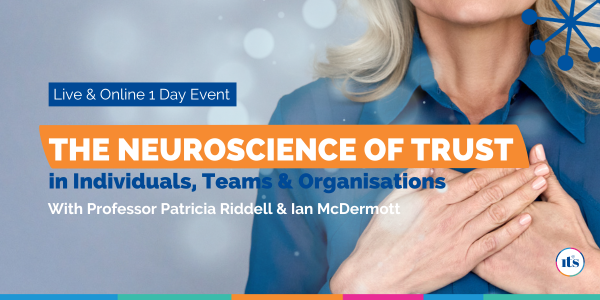
The Neuroscience of Trust in Individuals, Teams & Organisations
One day live-online workshop
Delivered by Professor Patricia Riddell and Ian McDermott
Trust is fundamental to building effective relationships between individuals, creating teams that work well together and for building the reputation of an organisation. It is also the basis for our confidence, or trust, in ourselves. Just a quick reflection on how our working and personal lives are different when we can place trust in others compared to when trust is missing, can help us to understand the importance of this in our day-to-day existence.
But what is trust? Where does it come from and how is it maintained? What happens when our trust is broken? And is this different when we are talking about trust in individuals, teams and organisations? These are some of the questions that we will address in this workshop.
A practical on-line workshop
This on-line workshop has been designed to help participants better understand the importance of trust to our lives, and what happens in the brain when trust is built, maintained and broken. We will then consider how we can learn to build and maintain trust whether this is in individual relationships, teams or organisations.
Overview
Our aim is to give you practical takeaways. That’s why we’ll be focusing on four key questions:
- What changes in the brain when we trust vs. when trust is broken?
- How is trust built and maintained within individual relationships?
- How do leaders help to build trust within teams?
- How do leaders create trust in an organisation and/or its products?
The Four Key Areas
What changes in the brain when we are under pressure?
What changes in the brain when we trust vs. when trust is broken?
Here we’ll explore the neuroscience of trust; how we recognise breaches of trust; and the ways that trust contributes to higher cognitive processes.
How is trust built and maintained in individual relationships?
Then we’re ready to look at what we can do to help build and maintain trust effectively with individuals. This is important both in professional relationships such as leader: employee, coach: coachee, salesperson: customer and in many other areas of our work life. It is also important for our relationships with family and friends.
How do leaders help to build trust in teams?
Teams work more effectively together when there is trust between the members of the team and when the team trust the leader to back them up. We will consider what is different about trust when we are in groups compared with trusting individuals and how this might affect how leaders build trust between members of a team.
How do leaders build trust in an organisation and its products?
Now we can turn our attention to the problem of creating trust in an organisation. How do we persuade customers to trust our products or services and what is different about trust in this context?
Learn Practical Skills
The workshop will provide lots of opportunities to practise new skills and to work with other like-minded individuals. You will leave with tools that can be used to improve your own leadership under pressure and which you can use to help other leaders to do this too.


